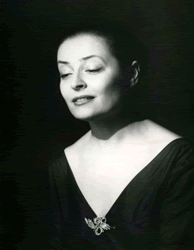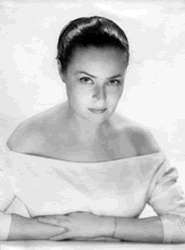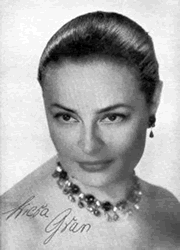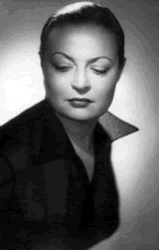Wiera Gran
Born Weronika Grynberg in Russia in 1916, the singer took the wartime stage as a young woman in the cabarets of the ghetto, singing of love and hope at the legendary Café Sztuka. She died in November 2007 in Paris.
Wiera (Vera) Gran performed under a number of aliases throughout her career - Sylvia Green, Wiera Green, Vera Gran. Captivated by her magnetic personality, her fans also took to calling her Wiera Magnes. She was born into a Jewish family as the daughter of Eliasz and Luba Grynberg. She had two sisters Hinda and Miriam. The family moved from Russia and initially settled in Wo?omin, outside of Warsaw, but in 1931 they moved to the city. There she enrolled in the dance school named for Irena Prusicka.
She soon began to sing professionally in Warsaw's popular cabarets, making a name for herself with her sultry, matte contralto. By the time the war broke out, she had also recorded 60 songs on 28 individual albums. When the war broke out, she continued to sing in the café and cabarets of the ghetto. She was the only one in her family to survive the war and for the rest of her life she would have to fight accusations that she collaborated with the gestapo in exchange for making it out of the ghetto. She proved her innocence time and time again, but many people continued to believe she was guilty and she was ostracised. She published an autobiography in 1980 to address the accusations and her fervent denials eventually mushroomed into an obsession.
She has also been the subject of a number of books by other authors, such as Remigiusz Grzela'sB?d? moim Bogiem / Be My God (2007) and Agata Tuszy?ska's notable Vera Gran - The Accusedof 2010, published subsequently in French and English, revived both the memory of the singer, but also of her purported crimes. She has also been the subject of the theatre, with Marcin Przybylski'sGran Operita taking the stage in 2011, and film, with Maria Zmarz-Koczanowicz's Wiera Granreleased in 2012.
In his commentary for the record Legendary Wiera Gran 1916-2007 released by Polskie Nagrania, Jerzy P?aczkiewicz wrote of the singer, Her brilliant intellect and sharp mind in time fell victim to her fears, prejudices and mistrust: fallacy became reality, and the demons of the past, mixing in with a diminished group of close friends and supporters, began to knock on the windows and doors of the cluttered apartment on rue Chardon Lagache, threatening her and reminding her of their existence.
http://www.youtube.com/watch?list=UUDjGF9d0GlRiSKns6y535AA&v=HfXnb3_EMCk
The beginning
Discovery of the singer's talent came about entirely by accident. She was working as a dancer in the Paradiso cafe on Warsaw's Nowy ?wiat and had broken her leg. Sitting in the wings with her leg in a cast, she began to sing to pass the time and her colleagues, hearing her voice, encouraged her to take up singing. She began singing at the Paradiso from off-stage, then when her cast was off, she took the stage. On the 1st of February 1934 she performed Brazilian Tango before the Paradiso's audience. In the spring of 1937 she performed at the Wielka Rewia theatre as part of the ongoing show titled Springtime Parade of Stars, alongside Mira Zimi?ska, Loda Halama, Kazimierz Krukowski andLudwik Sempoli?ski. She lost the gig when she failed to show up for a performance. She sang on the radio and in Warsaw's trendiest cafes. She went on tour to Kraków, ?ód?, Brze??, Bydgoszcz, Gdynia. Her earnings rose from 25 z? per day to 150, and up to 300 for radio shows.
In 1939 director Aleksander Marten cast her as the singer Bessy in the Yiddish film On a Hajm-bal shuwe, where she was featured alongside Ida Kami?ska. Gran had a contract with the Syrena Record company and also recorded to France's Odeon label.
Ghetto muse
In the fall of 1939 she was working in Lwów (today Lviv), but she returned to her apartment on Ho?a Street in Warsaw, where she lived with her mother until the Nazis evicted them both in 1940. She moved to Kraków to sing at the Polonia café, but when her mother and sisters were quartered to the Warsaw ghetto, she joined them out of her own will. That's when she began performing at the ghetto's Café Sztuka at 2 Leszno Street. In ?ycie surowo wzbronione / Life Gravely Forbidden(Warsaw, 1995), Antoni Marianowicz reflects upon her success on that stage:
The café became quite popular thanks to Wiera Gran's acts. The beautiful Wiera was accompanied by a fine piano duet: W?adys?aw Szpilman and Adolf Goldfeder, while her greatest hit was her and Szpilman's 15-minute interpretation of Ró?ycki's "Casanova", called "Her First Ball".
She continued to perform at Café Sztuka, as well as other venues in the ghetto, also donating her voice to the cause of Korczak's Home for Orphaned Children or to help struggling pianist Leon Boru?ski. On the 2nd of August 1942 Wiera Gran escaped the ghetto thanks to her lover Kazimierz Jezierski. She hid away in the countryside of Babice as his wife until the end of the war. Jezierski was a Jew of a so-called "safe appearance" that allowed him to pass for a gentile. She gave birth to a son in 1944 who only lived three months. The pair never wed formally, but they remained close for many years. After the war Jezierski worked as a surgeon and later for the Ministry of Public Safety as a commissioned doctor for the Rakowiecka prison until 1954. In 1963 he left Poland, but maintained an epistolary correspondence with Wiera Gran until 1975, the year he married. He died in 1994.
Dark legend
Her escape from the ghetto inspired a number of rumours, namely on the part of Jonas Turkow, an actor and director, who claimed she had collaborated with the Nazis. After the war she personally appealed to the prosecutor in a desire to clear her name of these allegations. The matter was complicated by the fact that her performances in the ghetto, an area of extreme poverty, were nonetheless enjoyed by a privileged public. In particular, the Judenrat, many members of whom consorted with the Nazis. Entertainers certainly had an opportunity to bear witness to significant interests and exchanges, but were wary of sharing what they had seen. The Prosecutor's office gave up the investigation in November of 1945 based on lack of evidence. The common law court of the ZASP artists association, under the direction of Aleksandr Zelwerowicz, declared in December that there was nothing amiss regarding Gran's behaviour during the Nazi occupation. In January 1946 he Verification Commission of the Musicians Professional Labour Association (ZZM) found that Gran had not "compromised the honour of Poland in any way" and granted her permission to continue her craft. The Citizen's Court associated with the Central Committee of Polish Jews (CK?P) held over a year of hearings before declaring her innocence in January 1949. In his book, Antoni Marianowicz writes of the trials:
I find them to be shamefully idiotic. Wiera Gran was the most popular singer of the ghetto and I never heard an ill word about her. On the contrary, she was known for her charity and philanthropy. The pretense that she had "consorted" with Jewish gestapo agents I find unfounded. […] I never heard anyone accuse her off malconduite or of taking advantage of her contacts for lowly aims. These accusations, hence, may only have to do with personal animosities and plain envy.
Joanna Szcz?sna posits a similar stance, suggesting that the accusations against Gran were based on rumours and gossip. She wrote an article in defense of Wiera Gran for the Gazeta Wyborcza daily - "She was not an agent" (23.11.2010), drawing upon the words of Marek Edelman just after the war, which stated that Wiera Gran's only crime was her voice and talent, which was greater than that of Diana Blumfeld - incidentally, Turkow's wife.
Accusations against the pianist
The tragedy of the talented young singer who had lost her entire family in the war and was trailed her whole life by accusations and enemies had a psychological impact on Gran. She b began to suffer from paranoia, which might explain why she claimed that there was a pianist among the Jewish policemen in her book Sztafeta oszczerców / Race of Slanderers. She wrote:
Among the inhuman screams breaking out, the Jewish militiamen were beating everything in sight with a head on its shoulders. At the sight of a woman being beaten with a baton, I wanted to scream! This shameful act was done by the hands of... the pianist! I saw him like the back of my own hand. He survived the war. He's doing quite well. I want him to know that I saw this. Even though I have evidence against him, I have no need for merciless revenge.
Gran never revealed the pianist's name, yet in her biography of Gran, Agata Tuszy?ska ascribes the part of the brutish pianist to W?adys?aw Szpilman, the tragic hero of Roman Pola?ski's The Pianist. The real-life Szpilman died in 2000, but his family has come to his defense, filing a lawsuit against Tuszy?ska and the Wydawnictwo Literackie publishing house for defamy. At the trial in Warsaw, in early April 2013, 91-year-old W?adys?aw Bartoszewski, the last living member of the Jewish Assistance Council testified that:
I never had any information that Szpilman was in the police. I didn't even know that he was in the ghetto. I believe that if a man of his stature had been a policeman in the ghetto, it's impossible for it not to have become common knowledge within the Jewish community.
After the war
Wiera Gran began singing again, joining Stefan Racho?'s orchestra in a performance for Polish Radio in November 1945 and latered toured with the orchestra. She sang "Her First Ball", accompanied by W?adys?aw Szpilman and Czes?aw Anio?kiewicz. She also performed at the Syrena Theatre in ?ód? and the Casanova café in Kraków. She also recorded music for the Odeon label in Pozna? and starred in Jeremi Przybora's radio programme Teatr Eterek in 1950, singing Przybora's "Prys?y zmys?y" / "Rent Senses" in the role of Lola van Szezlong
In November 1950 she emigrated to Israel and lost her Polish citizenship. Yet the accusations of consorting with the Nazis continued to haunt her and two years later she left for Paris, where she began performing at the Comodor Hotel and the Dinarzade cabaret. In the 1950s she rose to stardom in France, winning over audiences and critics. She sang at Maurice Chevalier's Alhambra, and collaborated by Charles Aznavour and Jacques Brel. She also performed in London at the Ref-Rena Polonia Theatre run by Marian Hemar and Feliks Konarski. Zygmunt Kon, London correspondent for the Polish daily Dziennik Polski i Dziennik ?o?nierza, wrote of her "deep voice of a sensual tone, clean diction, predilection for fortissima in her vocal interpretation and fluid daramtic expression. With a varied scale of emotion she sincerely expresses the outrage and indignation of a woman's spirit" (31.08.1959).
She toured the world - Sweden, Canada, United States, Spain, Switzerland, Belgium, Mexico. She also starred in Frederic Rossif's film Le temps du ghetto and recorded for Radio Free Europe and the Polish edition of Radio France Internationale. In 1965 she returned to Poland for three months, taking part in concerts and recording an album with Jerzy Abratowski's orchestra. She and Szpilman recorded a new version of "Her First Ball" penned by Bronis?aw Brok.
In the summer of 1969 she sang at New York's Carnegie Hall and in 1970 at the Salle Pleyel in Paris. She traveled to Israel to sing but was denied after former concentration camp inmates protested, declaring they would wear striped uniforms to the "gestapo whore's" show. She returned to Paris and began writing Race of Slanderers, which she published independently in 1980. In the meantime, throughout the 1970s, she would return to Israel to carry out defamation lawsuits, which were endlessly delayed for procedural reasons.
At the end of 2006 Wiera Gran took up residence as a pensioner at the Polonia Home in Lailly-en-Val. She died on the 19th of November 2007 at St. Casimir's Home in 119 rue Chevaleret in Paris (where Cyprian Kamil Norwid had also spent the august years of his life over a decade before). She was buried in the Jewish Cemetery in Pantin, outside of Paris. Her funeral was attended by 13 people, including 4 nuns, 2 rabbis. Her plot had been purchased for no more than ten years.
On the day of her passing Marcin Przybylski read a selection from the novel B?d? moim Bogiem / Be My God, inspired by the life of the singer, on Polish Radio.
Career highs
Wiera Gran had a number of hits throughout her career, such as "List" / "Letter" (music by Eddy Courts), "Fernando", "Varsovie de mon enfance", "Ma Patrie", "Mazowiecki wiatr" / "Mazovian Wind". In 1946 in Paris she recorded "Nasza ulica" / "Our Street", with music by Olgierd Straszy?ski and lyrics by Janusz Odrow?? for the Odeon Label, as well as "Ulic? Nieca??" / "Broken Street", with lyrics by Marian Hemar, after the war. A number of compilations of her songs have been published over the years, her voice still captivating listeners decades after she first performed them in the ghetto. As Marian Fuks wrote in his diaries Z diariusza muzycznego, Warsaw 1977/1981,
She fascinated listeners with her beautiful, low, velvety voice, simple interpretation, natural composure, lack of pretension. Her repertoire was ambitious. Her uncanny lyrics were meant for an intelligent, intellectually discerning, exclusive public. She represented her own style of performance. This smoothly coiffed brunette, with her large bun, in a black dress buttoned up to the neck and long sleeves, made a huge impression. She broke through to great art without loud publicity and devious impresarios, she made use of her own energy and talents. She quickly achieved success.
In 2006, on the occasion of the 3rd National Retro Music Festival, the Minister of Culture and National Heritage Kazimierz Micha? Ujazdowski granted her the Honourary Diploma for lifetime achievement in her field and the popularisation of the interwar period of the 1920s. That same year she also received Mieczys?aw Fogg's Golden Leaf (Z?oty li??) distinction. She died in Paris in 2007.
Author: Janusz R. Kowalczyk, April 2013. Translated by Agnieszka Le Nart, April 2013.



